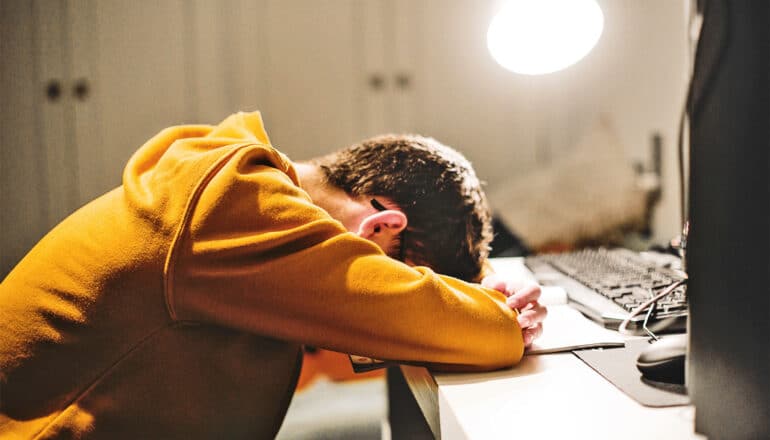
College students don’t get nearly enough sleep, and that is negatively affecting their higher-level cognitive skills—also known as executive function—and working memory, according to a new study.
Researchers looked specifically at diverse college-aged students, a demographic that isn’t looked at often in these kinds of studies.
“Other studies on this topic include over 85% non-Hispanic white, while our sample was 27.5% non-Hispanic white, 31% Black, and 27.6% Asian. Much more diverse than all prior studies,” says Tricia King, a professor at Georgia State University.
“Research has found that less than 5% of neuropsychology research has focused on ethnic minority groups. It’s not really representative of our population,” says Maria Milagros Parrilla, a biology major working in King’s lab. “Personally, I have terrible sleep and I know a lot of my peers have really terrible sleep habits, too. So, I thought, we have a dataset that are college students just like me.”
After examining the literature with her graduate student mentor Rella Kautiainen, Parrilla decided to look for a relationship between bad sleep or a lack of sleep and things like working memory and executive function.
“Executive function is an umbrella term for many different higher-order thinking skills and working memory is one of those. Working memory is how well you are able to briefly hold and manipulate information, like remembering a phone number after being briefly interrupted by someone. Cognitive flexibility and inhibition are others,” King says.
“It’s all of these higher-order cognitive processes, like planning and problem-solving, that are very important in our day-to-day responsibilities” Parrilla adds.
The study included 29 participants who were an average of 20 years old. Participants filled out the Pittsburg Sleep Quality Index, which is a self-rated questionnaire that assesses sleep quality and disturbances over a one-month time interval.
In addition, Parrilla used information from informants for her research. The informants were people who see and interact with the participants daily, such as parents, roommates, and partners, and report on participants’ behavior.
After the participants in the study completed their surveys, the informants would then fill out both the Frontal Systems Behavior Scale (FrSBe) and the Behavior Rating Inventory of Executive Function (BRIEF). Researchers use the surveys to determine if the participants experienced apathy, disinhibition, and different problems, such as with working memory.
Using these measures, Parrilla was able to get a fuller picture of how bad sleep affects the lives of college students.
“We found negative correlations between the amount of sleep and working memory and executive function,” Parrilla says.
In total, 62% of participants reported poor sleep. Those who reported less than seven hours a night of sleep had much lower informant ratings of the person’s working memory and executive function.
These findings also align with previous research that used neuroimaging to show that individuals who slept less than seven hours a night had significantly less grey matter (brain tissue that plays a crucial role in allowing you to function normally) in their brains than those who got enough sleep.
Though their results were very similar to studies with less diverse groups, King and Parrilla say it’s important to be intentional in recruiting diverse individuals to better represent all demographics and replicate scientific findings.
The main takeaway for King and Parrilla is to urge college students to get more sleep.
“It’s going to help with your mood and your cognitive abilities,” Parrilla says. “Poor sleep quality in young adults was associated with decreased quality of life based on self-report measures of stress, depression, mobility, self-care, and pain and discomfort.”
King also encourages people to do their own research into good sleep hygiene, using sources like the American Academy of Sleep Medicine, which offers guidelines for good sleep.
The study appears in the journal Applied Neuropsychology: Adult.
Source: Georgia State
The post Too little sleep takes a toll on college students’ thinking appeared first on Futurity.
from Futurity https://ift.tt/avUk23C
No comments:
Post a Comment